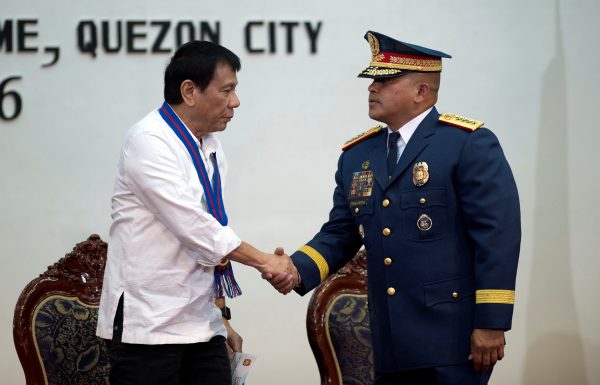Wishful thinkers speculated that the realities of taking office would see Duterte act in a more presidential and diplomatic manner. Such optimism evaporated as Duterte terrifyingly lived up to his campaign promise to implement his Davao model nationwide, setting his crosshairs on illegal drugs.
Philippines media estimate that over 1000 people have been extra-judicially executed by the police and unidentified vigilantes who appear free to act with impunity following Duterte’s exhortation that he will ‘give medals‘ to those who shoot drug lords. Duterte has also put targets on the back of 150 police and military officials, politicians and judges he’s accused of involvement in the drug trade, and whose names he has read out on live television.
In spite of the carnage, Duterte’s popularity remains high, with polls late last month suggesting that 91 per cent of Filipinos trust his leadership. In their desire to see a change in the status quo, many Filipinos ‘see in their tough-talking president a seriousness of purpose that is needed to turn things around for the ailing country’.
In our lead essay this week, Ronnie Holmes and Mark Thompson dissect how Duterte has ‘outmanoeuvred his opponents by exposing their own frailties’. Few politicians now dare to challenge the president. The Philippines’ personality politics, which has tended to be dominated by an oligarchy of prominent families, has resulted in weak basic political institutions and low levels of allegiance to political parties based on policy preferences. Duterte managed to gain ‘the support of most legislators who simply switched sides after his victory in search of presidential patronage’. The few who do speak out, such as the separately elected vice president, Leni Robredo, and neophyte Senator Leila de Lima, have drawn ‘the ominous warning from Duterte: “don’t fight me, you’ll lose”’.
Duterte has also knocked the media off balance, by suggesting that most of the assassinated journalists deserved it because they were ‘complicit with the corrupt politicians and other criminals they were supposed to expose’.
On the judiciary, Duterte appears confident enough to ignore the Supreme Court saying, with some cause, it has been politicised by previous governments, including, as Holmes and Thompson note, ‘in part through his predecessor Benigno ‘Noynoy’ Aquino’s removal of the Chief Justice’.
But rather than eradicating crime and drugs, the extra-judicial killings of thousands of people are only likely to add to the Philippines’ woes.
Extra-judicial killings have proved ineffective in other drug wars around the world. For example, as Holmes and Thompson explain, during the 2003 anti-drug crackdown by then Thai prime minister Thaksin Shinawatra, ‘nearly 3000 people killed extrajudicially were not linked to the drug trade. They were either accidental victims or targeted by corrupt police or vengeful vigilantes’. Previous patterns of drug use re-emerged at levels that had prevailed before the bloodshed. ‘Treating drug addiction as a health problem [is] a more effective way of dealing with the problem’, they conclude.
While his supporters point to the killings as tangible results against crime, Duterte’s drug war is worsening the Philippines very real problem with the rule of law. As Imelda Deinla has argued, ‘the Philippines has good laws adopted from best international practices but they are poorly or selectively enforced’, while dysfunctional accountability mechanisms breed ‘public officials who break the law, who abuse their authority, or who simply neglect their responsibilities in delivering public services’. Eradicating crime and corruption must start with addressing deficiencies in accountability to strengthen the rule of law rather than ‘fixing’ the problem by operating outside of the law.
On the economic front, the drug war is diverting attention away from urgent economic policy challenges. While the previous Aquino government was successful ‘in demonstrating that investor-friendly, market-enhancing economic policies and improvements in the governance framework lead to higher growth … the economy remains stuck with deep-seated problems of a high incidence of poverty and high levels of income inequality’. The breakdown of the rule of law risks undoing the good macroeconomic foundation that has been put in place and scaring away much needed investment.
The drugs campaign has also disproportionately afflicted the vulnerable and poor. While cocaine use has become popular among the children of the elite, they are hardly at risk of becoming victims of vigilante justice. The overwhelming majority of extra-judicial killing victims in the Philippines this year ‘are poor and from disadvantaged neighbourhoods’, Holmes and Thompson explain.
If the Philippines is to begin to address its drug, rule of law and economic challenges in earnest, it must start by halting Duterte’s ill-conceived war on drugs and extrajudicial vigilante executions, which will only beget increased violence and poverty.
The EAF Editorial Group is comprised of Peter Drysdale, Shiro Armstrong, Ben Ascione, Ryan Manuel, Amy King and Jillian Mowbray-Tsutsumi and is located in the Crawford School of Public Policy in the ANU College of Asia and the Pacific.

